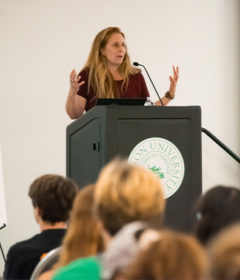Help Stetson Be #CyberAware


October is National Cyber Security Awareness Month, an annual campaign that raises awareness about cybersecurity. In 2017, more than 200 million identities were stolen, and if this trend continues, 2018 may set a new record.
Cybersecurity starts with you, which is why Stetson’s Office of Information Technology will be sharing cyber security awareness tips throughout the month — starting with perhaps the most important security element, your password, your “digital key.”
Follow the four S’s of password security:
- Make it STRONG.
- Make your password 16 characters or longer to prevent someone from trying to guess your password.
- Use two-factor authentication wherever possible to make it harder for someone to access your account, even if they gain access to your password.
- What is two-factor authentication? It is the use of another “factor” when you log in. Usually, this is a code that is sent as a text message, or through an app on your phone that you must acknowledge. For more information on two-factor authentication and how to turn it on, go to turnon2fa.com.
- Keep them SEPARATE.
- Always use separate passwords for your online services (do not use the same password over and over).
- Separate passwords ensure that your entire online life will not be stolen if someone were to gain access to one of your passwords. This makes it easier to fix when one of your online providers experiences a breach.
- STORE them somewhere safe.
- Notes, password spreadsheets, digital notes (in your mobile device) are not good ways to store your passwords.
- By utilizing a password manager, this makes it much easier to have STRONG, SEPARATE, SECRET passwords. Here are some suggestions for trusted password management programs/apps: com/5529133/five-best-password-managers.
- You should choose to always use multi-factor authentication, especially when using a password manager. If you need help in setting 2FA up on all of your online accounts, this site gives you step-by-step directions, turnon2fa.com/.
- Keep them SECRET.
- While it’s convenient to give your password to your significant other, your mom or your assistant – DON’T DO IT!
- Treat your login information like you treat your banking information! In some cases, that may be exactly what you are doing. Keep it SECRET!
Visit www.lockdownyourlogin.org for more information.
Questions or comments, contact I.T. at [email protected].



